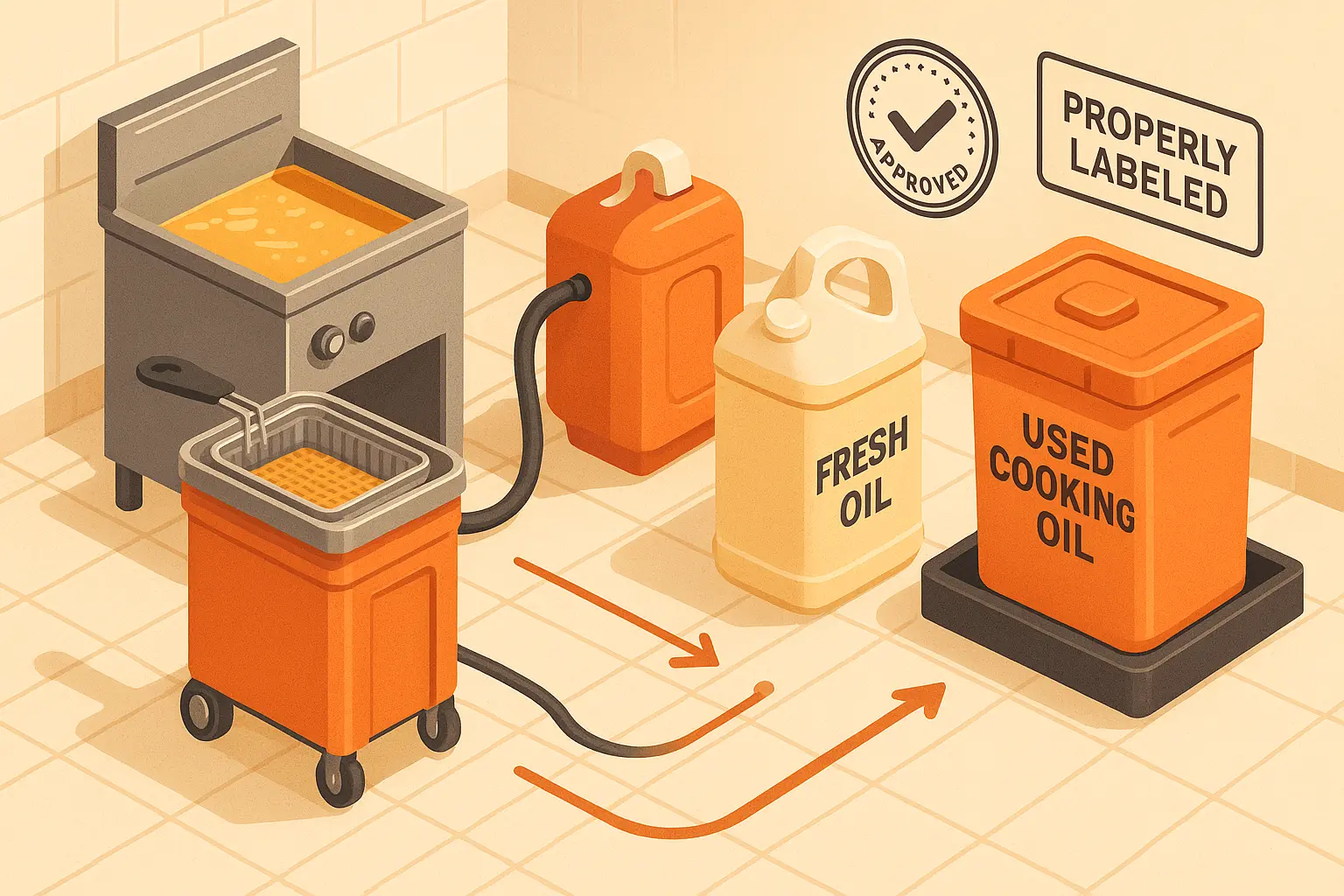Table of Contents
Introduction to Cooking Oil Storage
Proper cooking oil storage protects food quality, keeps costs under control, and shows inspectors that a restaurant takes local regulations seriously. Designated containers for fresh oil and for used cooking oil; including fryer oil and vegetable oil—keep fats out of plumbing systems and away from storm drains. Regular filtering removes food debris before it can settle in grease traps or carbonize on heating elements, so kitchens stay cleaner and equipment lasts longer. Understanding these basics is the first step toward a smooth health inspection.
Understanding Fryer Oil Usage
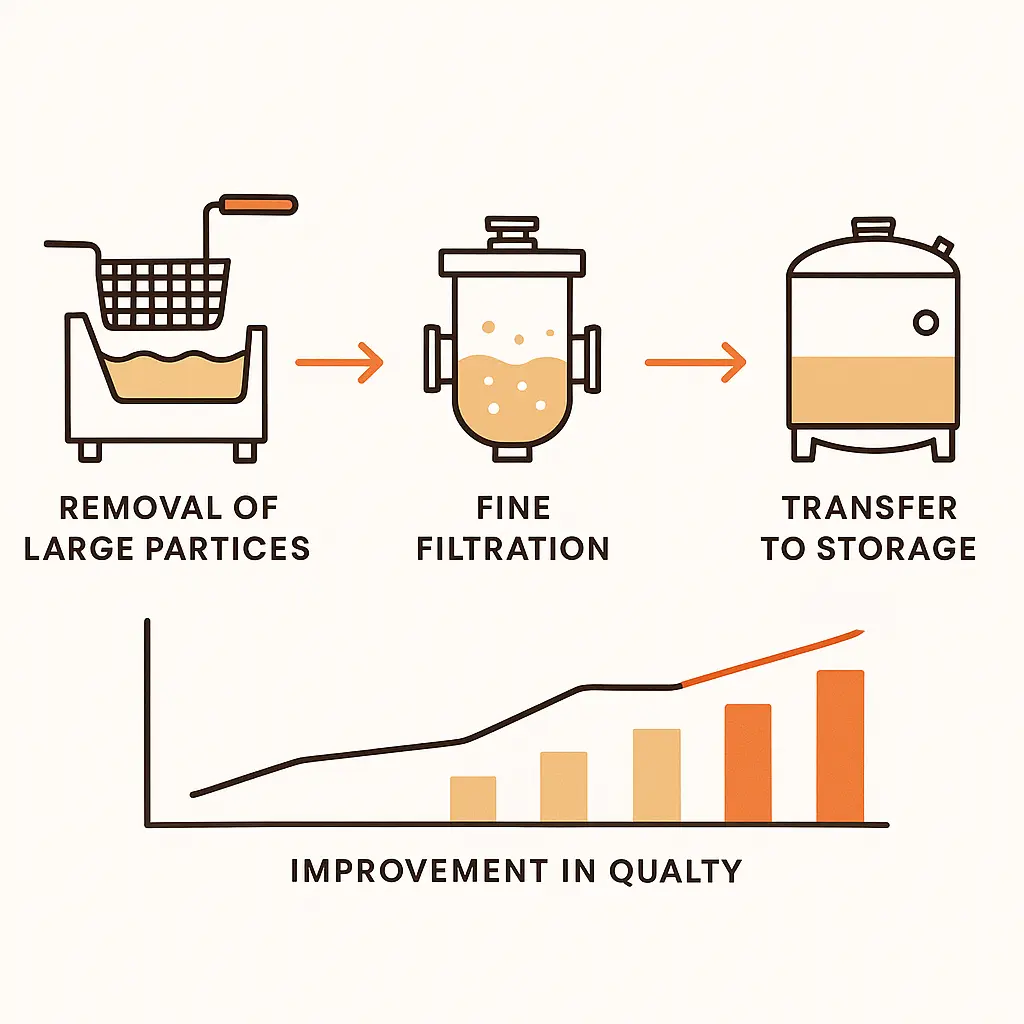
Used cooking oil quality changes with every basket of food. High-quality fresh oil produces consistent color and taste, while old oil darkens, foams, and shortens the life of kitchen equipment. Factors such as temperature, the volume of food items, and the presence of small amounts of raw meats or breading particles all affect lifespan. Regular filtering, skimming, and timely top-offs slow degradation, reduce waste, and make replacement schedules predictable.
Grease Traps and Prevention
Grease traps intercept fats, oils, and grease (FOG) before they hit the sewer system. A trap that is sized correctly, cleaned on schedule, and professionally maintained prevents backups, foul odors, and costly plumbing issues. When restaurants pair disciplined skimming with routine trap pumping, they stop buildup, comply with the Food Code, and avoid citations during the next health inspection. Routine pump outs keep traps legal; learn about our grease trap cleaning options.

Rules & Regulations for Restaurants
(FOG) Ordinance Library
For exact permit rules, discharge limits, and grease control forms, see the FOG Ordinance Library for Florida, Georgia, or New Jersey depending on your location.
Oil Disposal Methods
Pouring used fryer oil down a drain or tossing it in the trash is never acceptable; it clogs pipes, contaminates wastewater, and violates disposal regulations. Restaurants instead collect used vegetable oil in sealed, labelled containers and partner with licensed collection systems that transform it into biodiesel, animal feed, or industrial lubricants. Many restaurants earn money back because recycling companies pay for every drop. Partner with a licensed used cooking oil collector to pick up your oil instead of pouring it down the drain.
Health Inspection Preparation
Inspectors want proof of clean practice, not perfection. Staff members therefore need proper training and valid food-handling certificates. They should know how often to replace frying oil, how to pump traps safely, and why every batch of filtered oil matters. The FDA updates the Food Code every four years, so kitchen managers review it, run self-inspections, and rely on professional grease-trap and oil-recycling services to ensure compliance.
Environmental Impact of Used Oil
When used oil leaks onto pavement or seeps into storm drains, it coats surfaces, attracts pests, and poses fire hazards. In waterways, a thin film blocks sunlight and lowers oxygen levels, harming aquatic life. Over time, neglected disposal costs municipalities millions in sewer repairs. Recycling the oil into biodiesel cuts greenhouse gas emissions compared with conventional diesel, turning a liability into an environmentally responsible fuel.
Used Cooking Oil Management
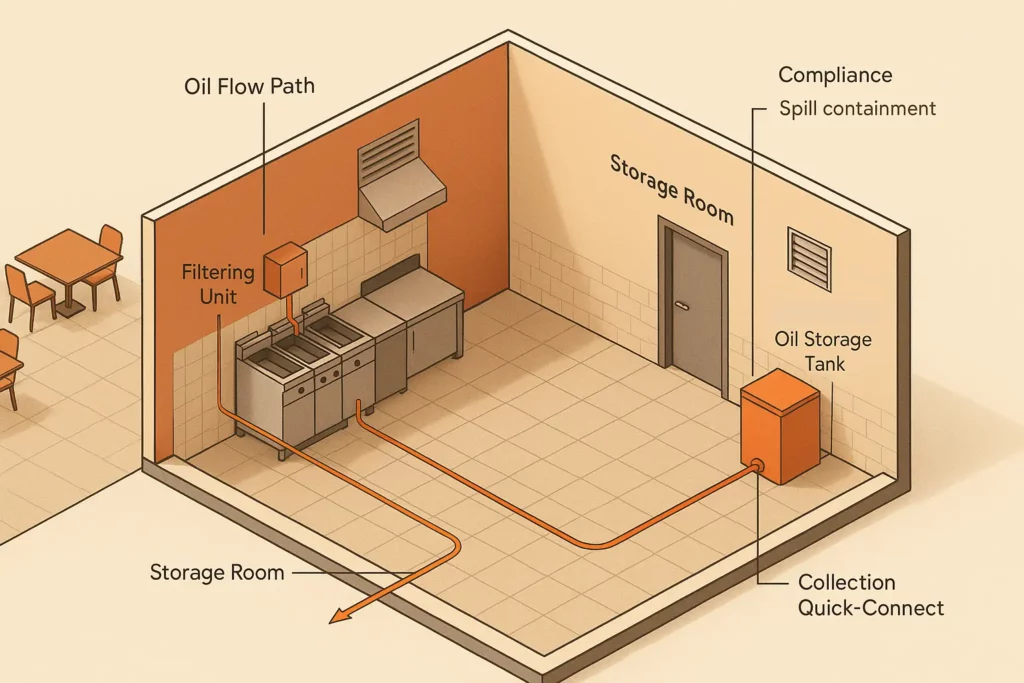
Effective used oil management begins at the fryer. The Grease Connection automated management system, for example, lets restaurants schedule frequent changes without lifting heavy pots, so food consistency stays high. Automated cooking-oil solutions hold fresh and used oil in separate, convenient tanks; they skim debris, filter the oil, and transfer it safely to rendering tanks that Grease Connections inspects and cleans on a regular cadence. These systems also protect employees from burns and slips because oil extraction happens behind sealed lines.
DIY Storage Solutions
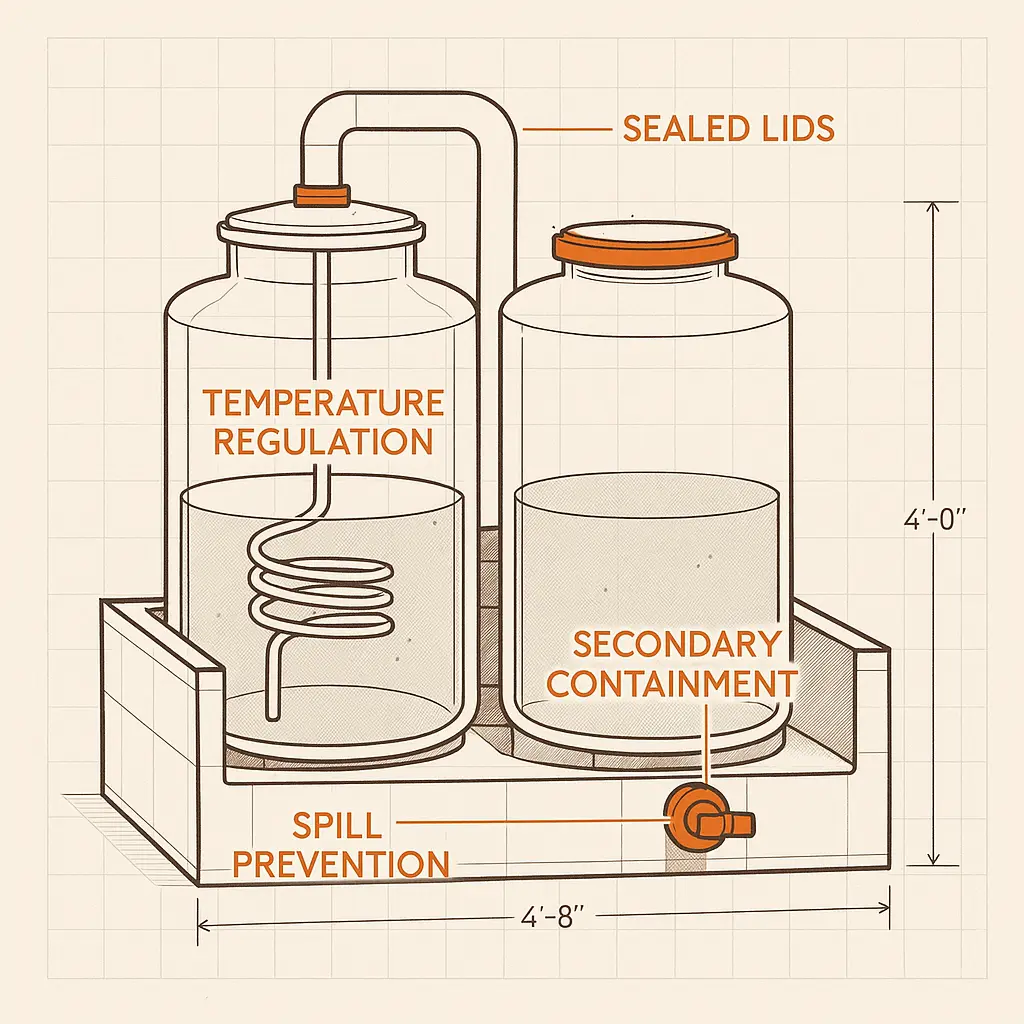
Not every kitchen installs a full automation suite on day one. DIY storage can still meet code when restaurants modify sturdy, food grade containers with heat resistant gaskets and color coded lids that separate filtered oil from old oil. Custom tanks fitted with quick connect hoses keep drains grease free and let staff empty fryers without spills. Locating each tank under cover and on a concrete pad prevents leaks from reaching soil or surface water.
Preventing Plumbing Problems
Plumbing failures usually start small: a bit of grease sticks to the pipe wall, then crumbs gather, then the line clogs. Restaurants prevent this chain reaction by removing food debris before it enters sinks, wiping pans with disposable towels, using screens over floor drains, and documenting every grease-trap cleaning. Frequent pump-outs and visual inspections keep wastewater flowing and expensive emergency calls at bay.
Financial Benefits of Proper Storage
Good oil management saves money twice. First, clean, filtered oil lasts longer, so kitchens buy fewer boxes of frying oil each year. Second, recyclers pay for collected waste oil, turning a headache into a revenue line. Reduced employee injuries and lower plumbing bills add further savings, proving that environmentally responsible practices can boost a restaurant’s bottom line.
Legal Responsibilities
Health departments, fire marshals, and environmental agencies all monitor fryer oil. Restaurants must store oil in designated containers, label them clearly, and use licensed haulers. Local ordinances may require spill-response plans or secondary containment around outdoor tanks. Owners who stay ahead of these rules avoid fines, protect licenses, and show customers that the business is committed to safe, clean operations.
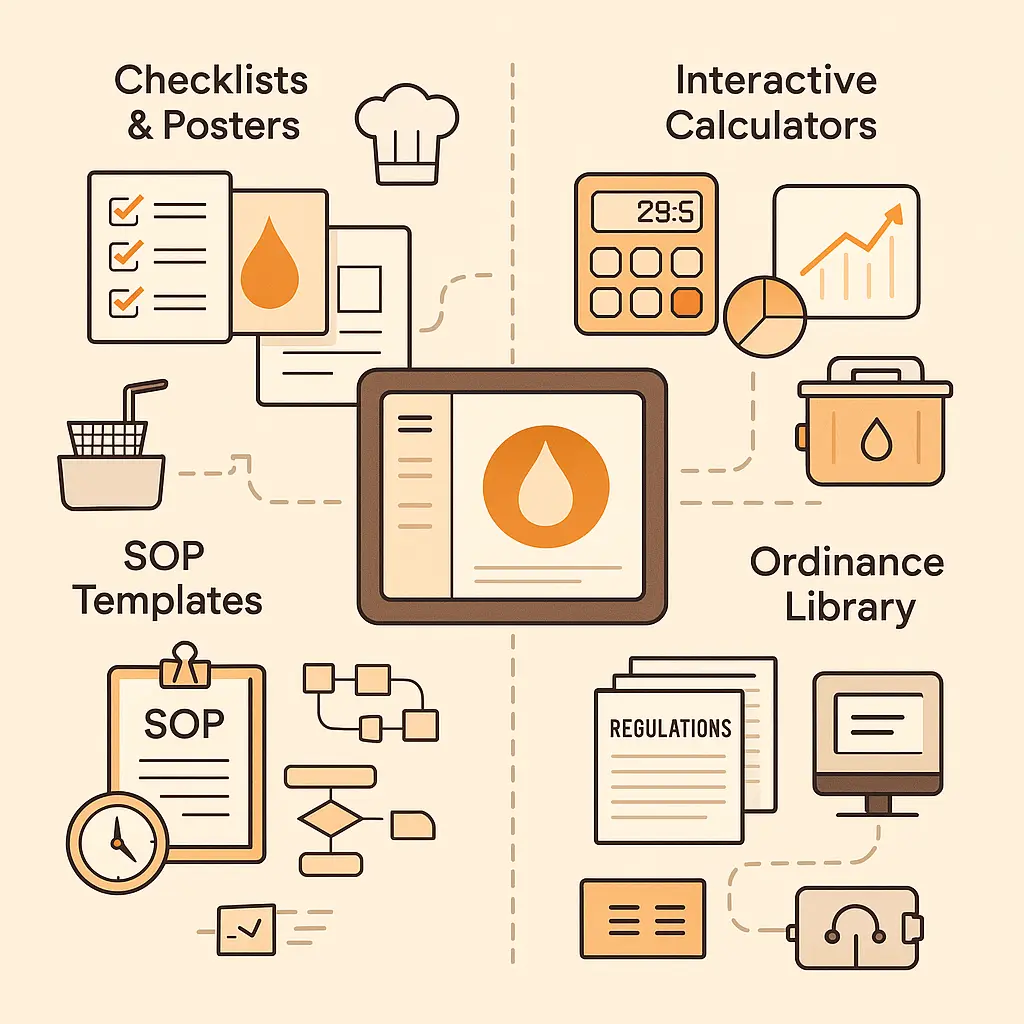
Need Tools & Templates?
Start using our ready to print checklists, SOP templates, and local ordinance guides built for restaurant managers and ops teams.
Conclusion and Recommendations
Fryer oil storage that passes inspection starts with designated containers, routine filtering, and a commitment to recycling. By embracing automated or custom oil-management systems, keeping grease traps immaculate, and partnering with certified collection companies, restaurants lower waste, prevent environmental hazards, and safeguard food quality. With proper training and clear procedures, staff understands why every drop of oil matters—and inspectors will see a kitchen that is compliant, efficient, and ready for success.

